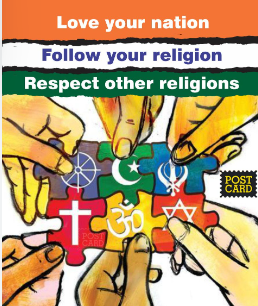Respecting Religion: A Thousand Words on Faith, Diversity, and Harmony
Religion, a deeply personal and profound aspect of human experience, holds a sacred place in the hearts and minds of billions around the world. In just a thousand words, let us explore the importance of respecting religion—an endeavor that embraces the richness of faith, celebrates the diversity of beliefs, and fosters harmony and understanding among all people.
At its essence, religion is a source of meaning, purpose, and transcendence—a guiding light that illuminates the path of individuals and communities on their journey through life. Whether through prayer, meditation, ritual, or scripture, religion offers a framework for understanding the mysteries of existence, grappling with the complexities of the human condition, and seeking connection with the divine.
But the value of religion extends far beyond its spiritual dimensions; it is also a powerful force for social cohesion, community building, and collective action. From the sacred rituals that unite families and communities to the charitable works that alleviate suffering and promote justice, religion provides a moral compass and a sense of belonging that enriches the fabric of society.
Central to the concept of respecting religion is an appreciation for the diversity of beliefs and practices that exist across cultures, traditions, and denominations. Just as there are countless languages, cultures, and ways of life that enrich the tapestry of humanity, so too are there myriad expressions of faith that reflect the unique experiences and aspirations of different peoples.
Respecting religion means honoring this diversity and recognizing the inherent dignity and worth of every individual, regardless of their religious affiliation or lack thereof. It means creating a culture of inclusivity and acceptance where people of all faiths (or none) are free to worship, practice, and express their beliefs without fear of discrimination or persecution.
Moreover, respecting religion entails fostering dialogue, understanding, and cooperation among people of different faiths, promoting interfaith harmony and cooperation. By engaging in respectful dialogue and seeking common ground, we can transcend the barriers of ignorance and prejudice that often divide us and build bridges of understanding and empathy that unite us as members of the human family.
But perhaps most importantly, respecting religion means embodying the values of compassion, kindness, and justice that lie at the heart of all great religious traditions. Whether it's feeding the hungry, caring for the sick, or advocating for the marginalized, the true essence of religion lies not in empty rituals or doctrinal disputes but in the way we live our lives and treat our fellow human beings.
In a world marked by division, conflict, and misunderstanding, the importance of respecting religion cannot be overstated. By embracing the richness of faith, celebrating the diversity of beliefs, and fostering harmony and understanding among all people, we can create a world where religion is a source of unity rather than division, a force for healing rather than harm, and a beacon of hope for a brighter future for all.

